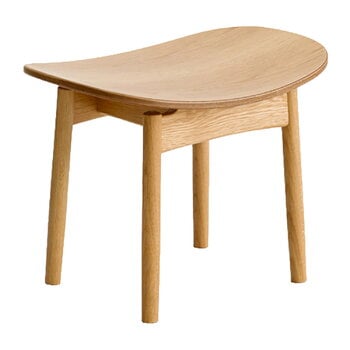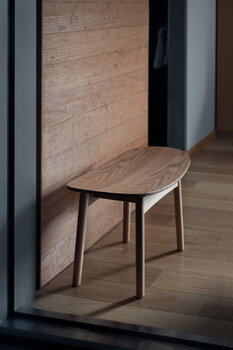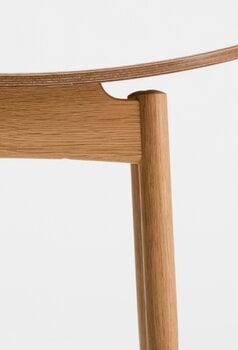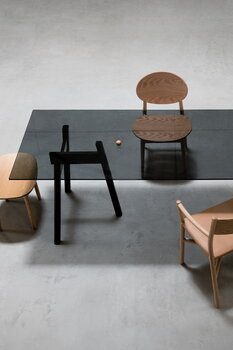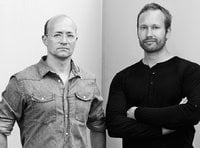The Saga Dining stool, designed by Anderssen & Voll, is a small stool defined by the oversized curved seat. The design is a combination of Japanese humbleness and Scandinavian respect for materials. This is also reflected in the stool’s name: Saga is a reference to the Japanese prefecture where the stools are made, and also to the ancient stories of the North.
Saga Dining stool, oak
Ariake
Description
The Saga Dining stool, designed by Anderssen & Voll, is a small stool defined by the oversized curved seat. The design is a combination of Japanese humbleness and Scandinavian respect for materials. This is also reflected in the stool’s name: Saga is a reference to the Japanese prefecture where the stools are made, and also to the ancient stories of the North.
Product details (6)
- Material
- Matt lacquered oak
- Colour
- Oak
- Width
- 21.65 in (55 cm)
- Depth
- 15.35 in (39 cm)
- Height
- 17.91 in (45.5 cm)
- Seat height
- 16.54 in (42 cm)
- Product ID
Designer
The design agency Anderssen & Voll was born in 2009, when Torbjørn Anderssen (b. 1976) and Espen Voll (b. 1965), founders of an Oslo-based design company Norway Says decided to start a new company. The duo share a similar background, having both studied at the Oslo School of Art and at the Bergen School of Art and Design, where Anderssen is currently a professor.
In terms of their work, they also share the same goals: Anderssen & Voll want to design and create products that will last a lifetime, both in terms of function and esthetics. The design studio has done work for a number of different clients, including Muuto, Swedes, Iform, Fjordfiesta and LK Hjelle. They have been awarded several prizes both in their home country Norway and abroad.
Read Anderssen & Voll's interview >
View all productsReviews (0)
Sustainability
The Product Sustainability Framework, our criteria of sustainable design, helps you find the most sustainable products in our selection. Read below which sustainability criteria this product has met.
Working conditions & labour 8/9
-
Equal opportunities for all employees
-
Commitment to UN Global Compact, fair compensation for all employees
-
Corporate responsibility requirements defined and communicated for suppliers
-
Systematic work for improved inclusion and well-being in the workplace
-
Transparent supply chain
-
Suppliers' compliance to a code of conduct ensured
-
Compliance to the UN Guiding Principles on Business and Human Rights ensured in the supply chain
-
Support for community involvement in the supply chain
Eco-friendly production 9/9
-
Fair and resource-wise water-use in production
-
No incineration or landfilling of returned items
-
No use of endangered species as materials
-
No direct environmental emissions or waste (excl. GHGs) from production
-
The sustainability of direct suppliers' production is addressed and monitored
-
Production and material sourcing that respect biodiversity, animal rights, and natural ecosystems
-
Material-efficient and ecological packaging
-
Positive impact on nature’s well-being through operations that regenerate natural ecosystems
-
No potentially harmful chemicals used in own production
Climate impact 4/8
-
Company's direct greenhouse gas emissions identified and commitment to reduction
-
Product's carbon impact identified and commitment to reduction
-
Guidance on energy- and eco-efficient use of the product
-
Contribution to climate initiatives beyond the brand’s direct operations
Sustainable materials 5/6
-
Sustainable and long-lasting material choices
-
No harmful or hazardous substances
-
Responsible raw material sourcing and production
-
Materials suited for circularity: monomaterials, recyclable finishings, renewable or recycled contents etc.
-
Ecological materials: natural, biodegradable, recyclable or recycled contents
Circular design 4/5
-
High aesthetic quality promoting long-term use of the product
-
Technically durable product design and material choices
-
Design for enduring life-long quality
-
Design and support for product maintenance, repair and upgradability

